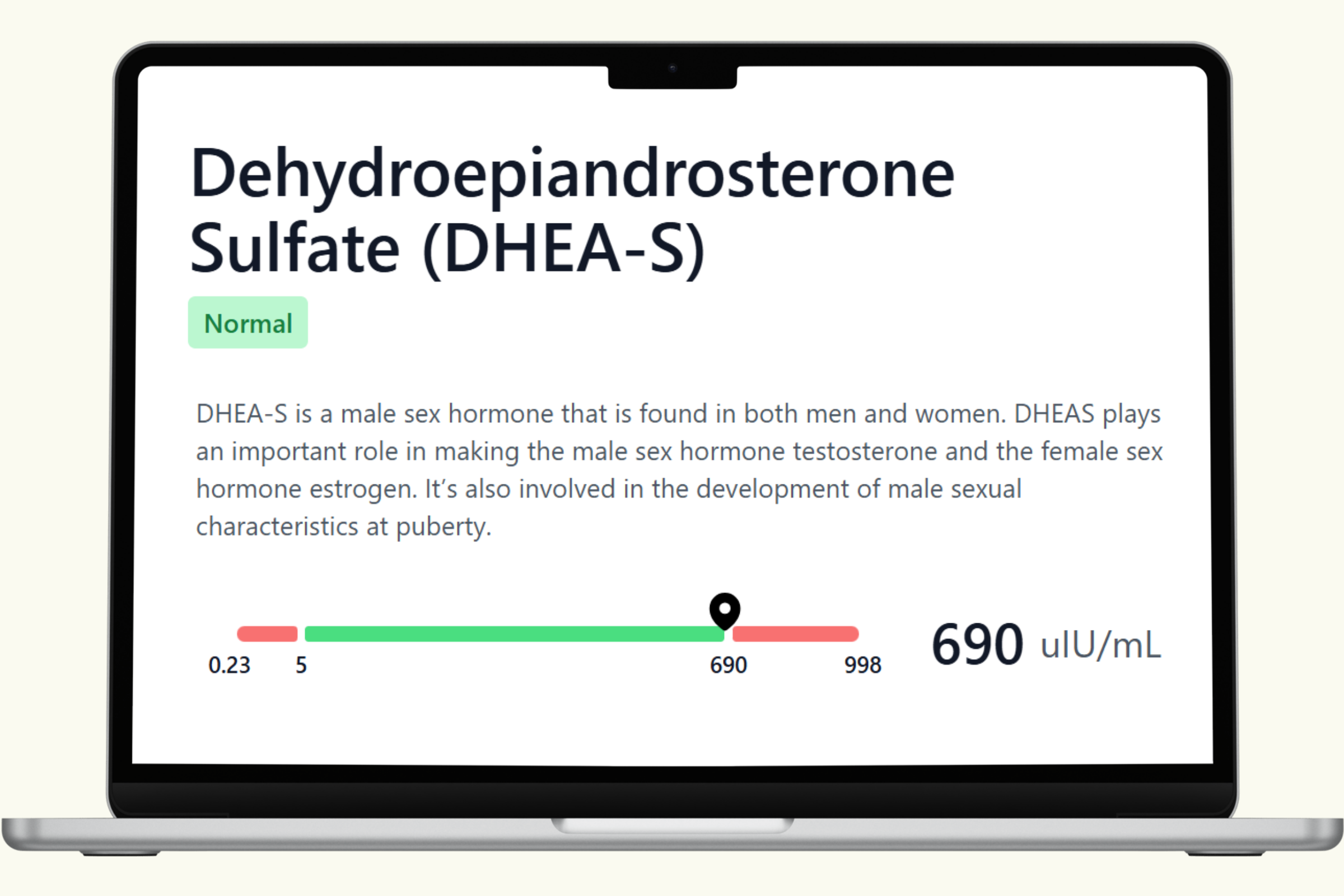DHEA-S Blood Test: Understanding an Essential Hormone for Male Vitality
Dehydroepiandrosterone sulfate (DHEA-S) is one of the most abundant steroid hormones in circulation and plays a critical role in men’s overall health. Produced mainly by the adrenal glands, DHEA-S serves as a precursor to both testosterone and estrogen. It supports a wide range of bodily functions, from immune health and metabolism to mood and cognitive performance.
The DHEA-S Blood Test, included in the PlexusDx Men’s Health & Wellness Blood Test, provides valuable insights into adrenal function, hormone balance, and long-term well-being. Using a simple at-home dried blood spot collection with an ADX card, this test makes it easy to measure DHEA-S without a clinic visit.
What is DHEA-S?
DHEA-S is the sulfated form of dehydroepiandrosterone (DHEA), which allows it to circulate in the blood at stable concentrations. This makes DHEA-S an excellent marker of adrenal hormone production. As a prohormone, DHEA-S can be converted into testosterone and estrogen as needed by the body, making it an important regulator of the hormonal environment in men.
Levels of DHEA-S are highest in early adulthood and decline steadily with age, which is why it is often referred to as a biomarker of aging and vitality. Monitoring DHEA-S can provide clues about adrenal health, resilience to stress, and overall hormonal balance.
Why DHEA-S Matters for Men
1. Precursor to Testosterone and Estrogen
DHEA-S acts as a building block for other sex hormones. Balanced levels ensure that testosterone and estrogen production remain supported, particularly as men age and natural hormone production declines.
2. Immune Support and Resilience
DHEA-S enhances immune system activity and helps protect against chronic illness. It has been shown to modulate inflammation and support the body’s defense against infections.
3. Muscle Strength and Physical Performance
Because of its role in testosterone production, DHEA-S contributes to muscle strength, energy, and stamina. Low levels are linked with decreased physical performance and age-related muscle loss.
4. Insulin Sensitivity and Metabolic Health
DHEA-S influences how the body uses glucose and insulin. Optimal levels may improve blood sugar regulation and reduce the risk of insulin resistance and type 2 diabetes.
5. Bone Density and Skeletal Strength
DHEA-S contributes to bone health by supporting bone mineralization. Men with low DHEA-S are more likely to develop osteoporosis as they age.
6. Cognition and Brain Function
Research suggests that DHEA-S supports memory, focus, and mood. Declining levels are associated with cognitive decline, brain fog, and an increased risk of age-related neurological conditions.
7. Skin Health and Appearance
DHEA-S helps maintain skin hydration, elasticity, and repair. Low levels may contribute to thinning skin, dryness, and accelerated visible aging.
DHEA-S and Stress Response
Like cortisol, DHEA-S rises in response to stress. However, while cortisol can be harmful in excess, DHEA-S helps buffer and balance its effects. This dual relationship supports resilience, recovery, and protection against the damaging consequences of chronic stress.
How DHEA-S is Measured
The PlexusDx Men’s Health & Wellness Blood Test measures DHEA-S from a dried blood spot sample. Because DHEA-S levels remain relatively stable throughout the day, the test provides a reliable picture of adrenal and hormonal health without the need for multiple collections.
Reference Ranges for DHEA-S in Men
Reference ranges vary by age, since levels decline naturally over time. Typical values are:
- Ages 20–29: 280 – 640 µg/dL
- Ages 30–39: 120 – 520 µg/dL
- Ages 40–49: 95 – 530 µg/dL
- Ages 50–59: 70 – 310 µg/dL
- Ages 60+: 42 – 290 µg/dL
Functional medicine practitioners often emphasize the importance of maintaining DHEA-S in the upper half of the age-adjusted range for optimal vitality, resilience, and healthy aging.
What High DHEA-S Can Mean
Elevated DHEA-S levels may indicate excessive adrenal activity or an imbalance in hormone regulation. Possible causes include:
- Adrenal hyperplasia (overactive adrenal glands)
- Adrenal tumors (rare)
- Excessive stress or chronic inflammation
- Overuse of DHEA supplements
High DHEA-S may cause acne, oily skin, mood swings, or hormone imbalances if not properly managed.
What Low DHEA-S Can Mean
Low DHEA-S is common with aging but may also signal adrenal dysfunction or chronic illness. Contributing factors include:
- Adrenal insufficiency or Addison’s disease
- Chronic stress and burnout
- Inflammatory conditions
- Long-term use of corticosteroid medications
Symptoms of low DHEA-S include fatigue, reduced libido, muscle weakness, poor stress tolerance, and accelerated aging.
Why You Should Get Your DHEA-S Checked
Monitoring DHEA-S helps evaluate adrenal function, hormone balance, and aging resilience. Understanding your DHEA-S level can help:
- Explain fatigue, low libido, or mood changes not explained by other hormone tests
- Assess stress response and adrenal health
- Support bone density, muscle strength, and healthy metabolism
- Track age-related decline and optimize long-term vitality
With the PlexusDx Men’s Health & Wellness Blood Test, you can measure DHEA-S easily at home and pair results with other critical biomarkers like testosterone, cortisol, and SHBG to get a full picture of your hormonal health.
Conclusion
DHEA-S is a vital hormone that supports testosterone production, immune defense, muscle strength, brain function, and resilience to stress. Because levels peak in early adulthood and decline with age, measuring DHEA-S provides valuable insight into both current health and long-term wellness. Both high and low levels can affect quality of life, making this biomarker an important part of proactive men’s health.
The PlexusDx Men’s Health & Wellness Blood Test makes it easy to track DHEA-S at home, giving men the knowledge they need to maintain balance, resilience, and vitality as they age.

Share:
Thyroid-Stimulating Hormone (TSH) Blood Test
Cortisol Blood Test